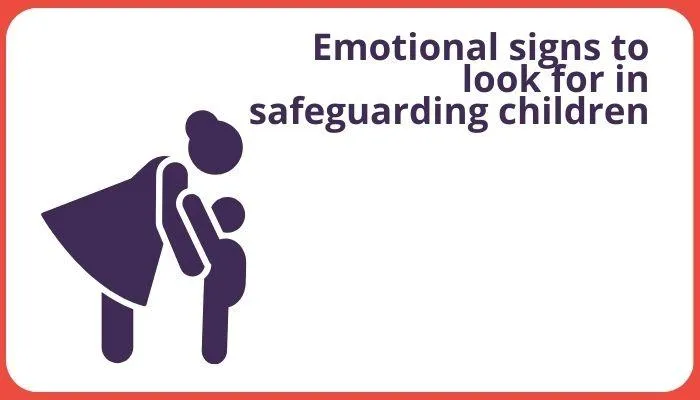Every child's well-being matters.
Types of Abuse Articles
Quick Access
Abuse of Authority
Abuse of Discretion
Abuse of Power
Behavioural Indications
Breast Ironing
County Lines
Cultural Differences (Physical Abuse)
Domestic Abuse
Economic Abuse
Emotional Signs
Exposure to Substance Abuse
Failure to Thrive
Female Genital Mutilation (FGM)
Forced Marriage
Hate Crimes & Targeted Harassment
Impact of Domestic Violence
Impact of Environment
Impact on Development
Institutional Abuse
Isolation
Modern Slavery
Neglect
Online Abuse
Parental Behaviours
Physical Abuse
Radicalisation
Religious Abuse
Restraint
Sexual Abuse
Types of Abuse
Witnessing Domestic Abuse

What are the emotional signs to look for in safeguarding?
Signs in a Child:
Sometimes, when a child seems really sad or keeps to themselves a lot, it might be a sign that something is bothering them. If a child you know suddenly becomes really quiet or stops playing with friends, it's worth paying attention to.
Imagine if a child started behaving in a way that seems different from their usual self – maybe being more angry or doing things they wouldn't normally do. This kind of change could be a sign that something is not right.
Listening and understanding their feelings is essential if a child you care about is always scared or anxious, especially around certain people. Fearfulness can sometimes signal that something is wrong.
Have you noticed a child becoming upset more easily than before? This could indicate that they are going through a tough time and might need some support.
Think about a child who is constantly tired or having trouble sleeping. This might be a sign of stress or worry they're dealing with.
Signs in a Parent or Carer:
If someone in a caregiver role is always getting really angry, especially towards the child, it's a concern. Caregivers should provide love and support, not anger and frustration.
Imagine if a parent or caregiver seems uninterested in their child's life – not asking about school, friends, or activities. This lack of interest can be a sign that something might be wrong.
While rules are important, being overly strict or controlling all the time might not be healthy. Children need freedom to learn and grow, and an overly strict environment can cause concern.
If a parent or caregiver is using drugs or drinking a lot, it can affect their ability to take care of the family. This behaviour is something to be aware of, and help should be sought if necessary.
AUTHOR:- Iona has nearly 10 years of experience supporting nurseries and childminders in curriculum planning, leadership, and safeguarding. Her writing is informed by public information and sector insight, aiming to provide accessible, practical support for professionals working with children. She is part of the On the Button team, helping deliver Well-being, Safeguarding and Complaint Management Software that empowers practitioners to identify concerns early and act confidently.
On the Button provides innovative software tailored to the needs of the early years sector, with a strong focus on EYFS well-being and early years safeguarding. Our tools help senior practitioners to confidently track concerns, maintain robust records, and respond effectively — all while meeting statutory guidance. From early years complaint management to team-wide safeguarding alerts, our platform puts children's safety and emotional health first.
Quick Access
Abuse of Authority
Abuse of Discretion
Abuse of Power
Behavioural Indications
Breast Ironing
County Lines
Cultural Differences (Physical Abuse)
Domestic Abuse
Economic Abuse
Emotional Signs
Exposure to Substance Abuse
Failure to Thrive
Female Genital Mutilation (FGM)
Forced Marriage
Hate Crimes & Targeted Harassment
Impact of Domestic Violence
Impact of Environment
Impact on Development
Institutional Abuse
Isolation
Modern Slavery
Neglect
Online Abuse
Parental Behaviours
Physical Abuse
Radicalisation
Religious Abuse
Restraint
Sexual Abuse
Types of Abuse
Witnessing Domestic Abuse

What are the emotional signs to look for in safeguarding?
Signs in a Child:
Sometimes, when a child seems really sad or keeps to themselves a lot, it might be a sign that something is bothering them. If a child you know suddenly becomes really quiet or stops playing with friends, it's worth paying attention to.
Imagine if a child started behaving in a way that seems different from their usual self – maybe being more angry or doing things they wouldn't normally do. This kind of change could be a sign that something is not right.
Listening and understanding their feelings is essential if a child you care about is always scared or anxious, especially around certain people. Fearfulness can sometimes signal that something is wrong.
Have you noticed a child becoming upset more easily than before? This could indicate that they are going through a tough time and might need some support.
Think about a child who is constantly tired or having trouble sleeping. This might be a sign of stress or worry they're dealing with.
Signs in a Parent or Carer:
If someone in a caregiver role is always getting really angry, especially towards the child, it's a concern. Caregivers should provide love and support, not anger and frustration.
Imagine if a parent or caregiver seems uninterested in their child's life – not asking about school, friends, or activities. This lack of interest can be a sign that something might be wrong.
While rules are important, being overly strict or controlling all the time might not be healthy. Children need freedom to learn and grow, and an overly strict environment can cause concern.
If a parent or caregiver is using drugs or drinking a lot, it can affect their ability to take care of the family. This behaviour is something to be aware of, and help should be sought if necessary.
AUTHOR:- Iona has nearly 10 years of experience supporting nurseries and childminders in curriculum planning, leadership, and safeguarding. Her writing is informed by public information and sector insight, aiming to provide accessible, practical support for professionals working with children. She is part of the On the Button team, helping deliver Well-being, Safeguarding and Complaint Management Software that empowers practitioners to identify concerns early and act confidently.
On the Button provides innovative software tailored to the needs of the early years sector, with a strong focus on EYFS well-being and early years safeguarding. Our tools help senior practitioners to confidently track concerns, maintain robust records, and respond effectively — all while meeting statutory guidance. From early years complaint management to team-wide safeguarding alerts, our platform puts children's safety and emotional health first.

What are the emotional signs to look for in safeguarding?
Signs in a Child:
Sometimes, when a child seems really sad or keeps to themselves a lot, it might be a sign that something is bothering them. If a child you know suddenly becomes really quiet or stops playing with friends, it's worth paying attention to.
Imagine if a child started behaving in a way that seems different from their usual self – maybe being more angry or doing things they wouldn't normally do. This kind of change could be a sign that something is not right.
Listening and understanding their feelings is essential if a child you care about is always scared or anxious, especially around certain people. Fearfulness can sometimes signal that something is wrong.
Have you noticed a child becoming upset more easily than before? This could indicate that they are going through a tough time and might need some support.
Think about a child who is constantly tired or having trouble sleeping. This might be a sign of stress or worry they're dealing with.
Signs in a Parent or Carer:
If someone in a caregiver role is always getting really angry, especially towards the child, it's a concern. Caregivers should provide love and support, not anger and frustration.
Imagine if a parent or caregiver seems uninterested in their child's life – not asking about school, friends, or activities. This lack of interest can be a sign that something might be wrong.
While rules are important, being overly strict or controlling all the time might not be healthy. Children need freedom to learn and grow, and an overly strict environment can cause concern.
If a parent or caregiver is using drugs or drinking a lot, it can affect their ability to take care of the family. This behaviour is something to be aware of, and help should be sought if necessary.
AUTHOR:- Iona has nearly 10 years of experience supporting nurseries and childminders in curriculum planning, leadership, and safeguarding. Her writing is informed by public information and sector insight, aiming to provide accessible, practical support for professionals working with children. She is part of the On the Button team, helping deliver Well-being, Safeguarding and Complaint Management Software that empowers practitioners to identify concerns early and act confidently.
On the Button provides innovative software tailored to the needs of the early years sector, with a strong focus on EYFS well-being and early years safeguarding. Our tools help senior practitioners to confidently track concerns, maintain robust records, and respond effectively — all while meeting statutory guidance. From early years complaint management to team-wide safeguarding alerts, our platform puts children's safety and emotional health first.
Quality Early Years Ltd.,
Dickens House,
Guithavon Street,
Witham, Essex,
England, CM8 1BJ
© Quality Early Years Ltd 2025

Find On the Button
on Social Media

